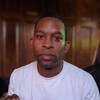Nigerian Police fire teargas at people during clashes between youths in Apo, Abuja, Nigeria on the 20th of October. Photo: KOLA SULAIMON/AFP via Getty Images
The Nigerian military opened fire on peaceful anti-police brutality demonstrators in Lagos on Tuesday night, killing a reported 15 people and injuring hundreds. The attack came on the 12th day of nationwide protests that started out as demonstrations against Nigeria’s Special Anti-Robbery Squad (SARS) – a unit of the Nigerian police force that has been accused of alleged extrajudicial killings and the indiscriminate extortion of young people – but have grown into a wider movement against systemic corruption and the country’s ruling class.More than 14 hours after the attack, the Nigerian president, Muhammadu Buhari, a former 1980s military dictator who was elected into office in 2015, has remained silent, choosing to maintain his now eight-day long national silence.Earlier in the day, Babajide Sanwo-Olu, the governor of Lagos State, announced a 24-hour curfew in Africa’s largest city, just four hours before the curfew was supposed to begin at 4PM. The governor claimed the measure was intended to restore law and order in the city, despite there being no evidence of activists causing any violence over the 12 days of demonstrations.The short notice sparked a citywide panic as millions of people were forced to immediately rush home. Protesters and non-protesters around Lagos who attempted to make their way home reported facing multiple checkpoints, with police officers and members of the supposedly disbanded SARS units attempting to take advantage of the sudden curfew by forcing protesters and non-protesters to pay their way through the blockades.Videos also show a Nigerian politician who has been identified as General Abiodun Bolarinwa whipping out a rifle and shooting at protesters in Abule Egba, a town in Lagos mainland, after being booed off. At least three protesters were shot by him.Still, by late afternoon, dozens of activists had gathered at the Lekki toll gate – a busy intersection in a wealthy suburb of Lagos Island that has become the epicentre of the city’s protests and where a large number of protesters have been camping for almost two weeks. Though some were there in defiance of the curfew, many were unable to go home even if they tried. By 5PM, most of Lagos was gridlocked in traffic.Over the next two hours, footage posted across social media shows the protesters in Lekki seated on the floor, waving Nigerian flags. The group routinely chanted the names of victims of police brutality and sang the national anthem. Some demonstrators had noticed earlier in the afternoon that plain-clothed officials had turned up to remove the CCTV cameras dotted around the toll gate, while footage had started to emerge on social media of multiple army tanks being driven into the city.Within two hours, at least 15 people were confirmed dead. Images and videos also seem to show ambulances that had been sent by the organisers of the #EndSARs protests – popular podcaster Feyikemi Abudu and the Feminist Coalition – were blocked by the army from treating victims.
Advertisement
Advertisement
At around 7PM, just moments after Sanwo-Olu announced the curfew would be pushed back to 9PM, street lights surrounding the toll gate were turned off, as was a giant illuminated billboard that towered over the intersection, plunging the sitting demonstrators into darkness. Moments later, multiple eye witnesses began to report hearing gunshots and seeing tear gas. Video from an office building overlooking the toll gate appears to show army officers approaching from the opposite end of the site and firing into the crowd.As the crowd scrambled, many of the protesters took to Instagram Live, showing in real-time activists tripping over themselves in panic and being shot by advancing military officers. The footage also showed a fire had been started at both ends of the toll, trapping many of the demonstrators in. Despite the scene, multiple protesters stopped to treat the injured, with footage showing a group of protesters attempting to remove a bullet from a victim’s leg. In the background, you can hear many of protesters still singing the national anthem.
Advertisement
“The unified voices of Nigerians have been treated as a threat to democracy instead of an expression of it,” The Feminist Coalition said in a statement on Tuesday night. “We unreservedly condemn the government’s use of violence against peaceful protesters.”The final death toll is still unknown, but locals hospitals have reported treating hundreds of victims.
In a statement posted at 4AM on Wednesday morning, the Lagos government acknowledged the killings, though Governor Sanwo-Olu suggested that he was not responsible for ordering attack. “This is the toughest night of our lives as forces beyond our direct control have moved to make dark notes in our history,” he said before promising a full investigation.Last week, Sanwo-Olu and officials across the country including the vice president, Yemi Osingbanjo, promised to work with activists to end police brutality and address other governance issues largely caused by systemic corruption. With reports on Wednesday morning of government buildings being burned down in response to Tuesday night’s attack, it’s unclear whether peace can be found in Africa’s most populous country.
